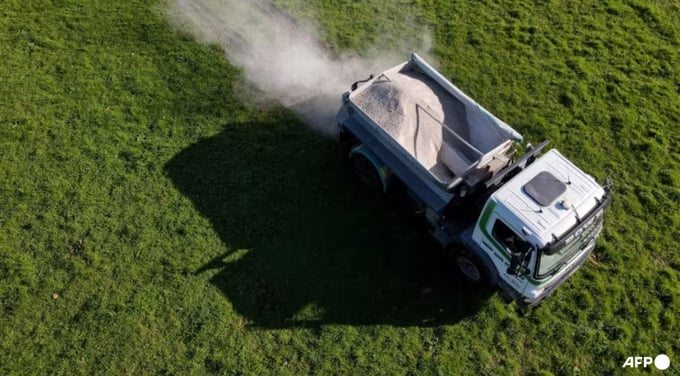June 17, 2025 | 20:05 GMT +7
June 17, 2025 | 20:05 GMT +7
Hotline: 0913.378.918
June 17, 2025 | 20:05 GMT +7
Hotline: 0913.378.918

The vast majority of nitrous oxide emissions are generated by agriculture, with most of the blame placed on nitrogen-based fertilisers and animal waste. Photo: AFP
Drawing on millions of atmospheric measurements from around the world, the report revealed a sharp rise in human-related nitrous oxide levels.
The findings raised researchers' concerns that too little is being done to rein in the gas, the vast majority of which is produced by agriculture.
Nitrous oxide heats the Earth's atmosphere 300 times more effectively than carbon dioxide, scientists say, and can linger for more than a century.
Emissions soared 40 per cent in the four decades to 2020, said the Global Nitrous Oxide Budget, which relied on the expertise of 58 international researchers.
As a result, levels of the gas in the atmosphere climbed to 336 parts per billion in 2022 - a 25 per cent increase over pre-industrialised levels.
The surge was far greater than previous predictions by the UN panel of climate scientists, the IPCC, said the report's lead author, Hanqin Tian from Boston College.
Nitrous oxide emissions must drop if global warming is to be limited to the Paris Agreement target of 2 degrees Celsius, Tian said.
"Reducing nitrous oxide emissions is the only solution since at this point no technologies exist that can remove nitrous oxide from the atmosphere."
Nitrous oxide, or laughing gas, is one of the three key greenhouse gases, along with carbon dioxide and methane, that contribute to human-driven climate change.
It also pollutes the soil, water, and air, and depletes the ozone layer.
"This emission increase is taking place when the global greenhouse gases should be rapidly declining towards net zero emissions if we have any chances to avoid the worst effects of climate change," said Tian.
Agriculture is the biggest offender, accounting for nearly three-quarters of human-related, or anthropogenic, nitrous oxide in the 10 years to 2020, the report said.
Other culprits were fossil fuels, waste and wastewater, and biomass burning.
In the four decades to 2020, agricultural emissions of the gas surged 67 per cent, it found, with most of the blame placed on nitrogen-based fertilisers and animal waste.
While global policies are in place to curb other greenhouse gases, nitrous oxide emissions are climbing virtually unchecked, said Pep Canadell, co-leader of the study.
"We need to be more aggressive with nitrous oxide - we have no policies anywhere and there are very limited efforts," Canadell, a chief researcher at Australia's national science agency, CSIRO, said in an interview with AFP.
The UN Intergovernmental Panel on Climate Change has estimated that nitrous oxide accounts for 6.4 per cent of total greenhouse gas emissions.
That figure is expected to grow in the coming years.
But if global warming is to remain below 2 degrees Celsius, anthropogenic nitrous oxide emissions need to decline by about 20 per cent by 2050, the new study found.
China, India, the United States, Brazil, Russia, Pakistan, Australia and Canada were the top nitrous oxide emitters, driven in part by their rapidly growing populations and increased demands on the food sector, the report said.
Europe - once the world's top nitrous oxide emitter - managed the biggest decrease by reducing the use of fossil fuels. Its emissions related to agriculture are slowly decreasing as well.
Emissions in Japan and South Korea also dropped.
New policies to limit nitrous oxide emissions could take up to 10 years to have an effect, Canadell said.
But many farmers were already seeking to reduce their emissions, including by more precise use of nitrogen fertilisers, genetic modification of crops, better animal waste management and more sustainable farming practices.
"If these emissions were to be reduced by whatever level, it will have a huge impact," Canadell said.
(CNA)

(VAN) Extensive licensing requirements raise concerns about intellectual property theft.

(VAN) As of Friday, a salmonella outbreak linked to a California egg producer had sickened at least 79 people. Of the infected people, 21 hospitalizations were reported, U.S. health officials said.

(VAN) With the war ongoing, many Ukrainian farmers and rural farming families face limited access to their land due to mines and lack the financial resources to purchase needed agricultural inputs.

(VAN) Vikas Rambal has quietly built a $5 billion business empire in manufacturing, property and solar, and catapulted onto the Rich List.

(VAN) Available cropland now at less than five percent, according to latest geospatial assessment from FAO and UNOSAT.

(VAN) Alt Carbon has raised $12 million in a seed round as it plans to scale its carbon dioxide removal work in the South Asian nation.

(VAN) Attempts to bring down the price of the Japanese staple have had little effect amid a cost-of-living crisis.